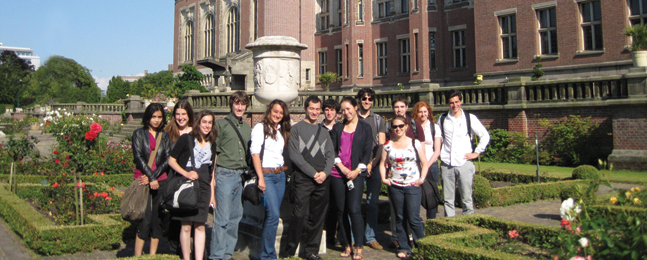Nothing Moot About Winning in The Hague

Richard Gaskins
Brandeis in The Hague Summer 2010 students outside of the Peace Palace.
In a strife-torn country, can a simple hate pamphlet lead to criminal charges for incitement to genocide? Is the district rebel leader responsible for the fatal shots fired into a menacing crowd by nervous recruits? Can a businessman be charged with war crimes when his chemical products are used by others for gas warfare unbeknownst to him?
For 18 Brandeis undergraduates, these were the central questions in a moot court competition held last July in The Hague, near the end of a six-week study course led by legal studies professor Richard Gaskins. The answers had to be found by parsing international legal codes that students had first encountered only weeks before, as they began the immersion program in the Dutch city known as “the world capital of peace and justice.”
This inaugural Brandeis Summer in The Hague, part of a new partnership between the university and the Grotius Centre for International Legal Studies at the University of Leiden, combined classroom discussions, visits to international courts, and interactive workshops linking lawyers and law students from some 20 countries. For the students, the learning curve was steep, with many new topics, new points of view and new ways of looking at the law.
“But what better way is there for liberal arts students to test their knowledge than to enter the moot court competition against trained lawyers, using judges from the famous international tribunals?” says Gaskins. Dividing into three teams, the Brandeis students performed extraordinarily well, he says.
One Brandeis team made it to the final round to face a French-speaking team with senior attorneys, including a French judge. The session was conducted with simultaneous translation, and each team was given just minutes to translate the opponents’ legal brief. In this instance, the Brandeis prosecutors edged out their formidable opponents — and all criminal charges were confirmed against the fictional defendants.
“This competition shows us how much bright undergraduates can accomplish when the challenge is great enough,” says Gaskins. “Winning the moot court competition sets a high bar for the next group of Brandeis students bound for The Hague this coming summer.”
For more information, visit http://www.brandeis.edu/acserv/abroad/.
